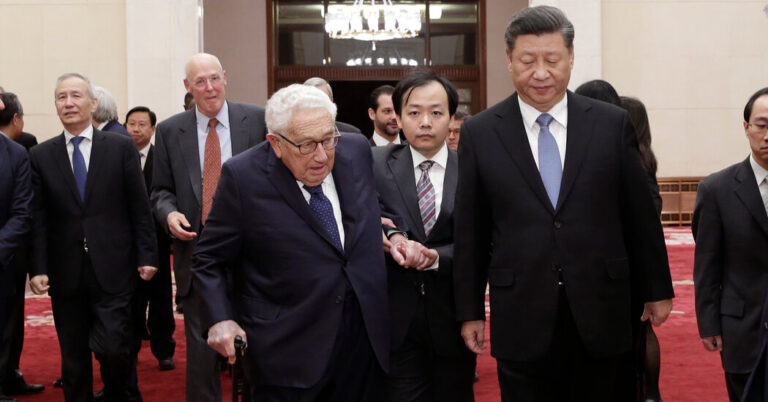
[ad_1]
Henry A. Kissinger, the 100-year-old former secretary of state who has pushed the United States to take a more conciliatory approach to China, has made a surprise visit to Beijing, meeting with China’s defense minister.
The previously unannounced trip by Mr. Kissinger, who more than 50 years ago helped pave the way for diplomatic ties between the United States and China during President Richard M. Nixon’s administration, coincided with a string of visits by currently serving American officials to China, to try and stabilize U.S.-China relations.
On Tuesday, the day that Mr. Kissinger met with the defense minister, President Biden’s climate change envoy, John Kerry, was also meeting officials in the Chinese capital.
But while other American officials have met with varying levels of chilliness or scolding from Chinese officials or state media, reflecting the geopolitical tensions, the defense ministry’s description of the meeting with Mr. Kissinger was warmer.
The fact that Mr. Kissinger engaged with the defense minister, Li Shangfu, at all was notable: China last month rebuffed a request for Mr. Li to meet Defense Secretary Lloyd J. Austin III, at a forum in Singapore. (China blamed the refusal on U.S. sanctions on Mr. Li.)
A State Department spokesman told reporters at a regularly scheduled briefing on Tuesday that the Biden administration had been aware that Mr. Kissinger was planning to travel to China. But the spokesman, Matthew Miller, said Mr. Kissinger was “there under his own volition, not acting on behalf of the United States government.”
Still, Mr. Miller noted that Mr. Kissinger had briefed American officials on his interactions with Chinese officials in the past, and that similar conversations could occur after this trip.
During the meeting with Mr. Kissinger, Mr. Li, the defense minister, said he hoped the United States would work with China to promote the “healthy, stable development of the relationship between the two countries and the two militaries,” according to the defense ministry’s statement.
Mr. Kissinger also called for the two militaries to strengthen communication, according to the statement.
During a visit to Beijing by the current secretary of state, Antony J. Blinken, last month — the first of the recent series of visits — Chinese officials had again rejected a request to reopen direct channels of military-to-military communications.
Shortly after Mr. Blinken’s visit, the treasury secretary, Janet Yellen, also traveled to Beijing.
Speaking with Mr. Kissinger, Mr. Li also criticized “some people in the United States” for “not meeting China halfway,” noting that the atmosphere for friendly communication had been “destroyed.”
Mr. Kissinger, the defense ministry said, had said he was “here as a friend of China,” and that the two countries should “eliminate misunderstandings, coexist peacefully and avoid confrontation.”
It was not immediately clear how long Mr. Kissinger would be in Beijing or whether he would meet with other officials, including China’s leader, Xi Jinping. Mr. Xi and Mr. Kissinger met in Beijing in 2019, when Mr. Xi told Mr. Kissinger that he hoped he would “enjoy many more healthy years ahead and continue to be a promoter of and contributor to Sino-U.S. relations,” according to Xinhua, China’s state news agency.
Chinese state media has long showered Mr. Kissinger with praise, especially as a foil to the more aggressive stances toward Beijing taken by recent American presidential administrations.
In an article in May, for Mr. Kissinger’s 100th birthday, the Global Times, a nationalistic party-run tabloid, said Mr. Kissinger was “legendary,” and “still keeps his great mind razor-sharp on U.S.-China relations by explicitly warning Washington” against an adversarial relationship.
[ad_2]